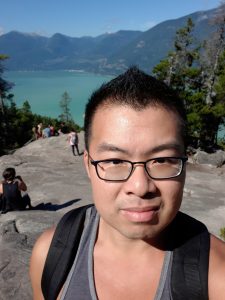
Donald received his undergraduate degree from UBC in Cell Biology and Genetics. During that time, he took a course on cell biology that discussed unusual cellular structures found in unicellular eukaryotes, or protists. From this, he gained an appreciation of the evolutionary processes and genetics that underlie this massive diversity found in protists and lesser-studied organisms in general.
He now works on completing his PhD dissertation in Dr. Naomi Fast’s lab in the Department of Botany, where they study the evolution of the spliceosome and pre-mRNA splicing in some of nature’s strangest and smallest eukaryotic genomes. He has studied the evolution of splicing in relict and highly reduced nuclei (nucleomorphs) that exist in plastids of a select few protist lineages, and also in a number of unicellular red algal species, including some from an unusual group of thermophilic and acidophilic red algae… that are not even red in colour at all!
He has been a TA for BIOL 341 (Introductory Molecular Biology Laboratory), BIOL 332 (Protistology), and BIOL 200 (Fundamentals of Cell Biology), where he shares his passion to undergrads about cellular and molecular biology, and eukaryotic diversity.
What do you most enjoy about being a TA?
The positive impact we can make on students as TAs, especially considering the difficulties of being an undergrad in a large university, brings me great satisfaction. While the primary objective as a TA is always on course materials and fostering a constructive learning experience for the students, I also realize we informally provide mentorship and advice as they navigate this chapter of their lives. Sometimes, I as a TA can simply be a face of reassurance, and that might just be as important too!
What has being a TA brought to your graduate studies experience?
Being a TA has greatly improved my skills as a science communicator. The constant practice of assessing the audience and tailoring my delivery accordingly transfers very well to giving good presentations and talks at conferences. It has also brought me in touch with all those in our departments who are strongly passionate about providing an excellent learning environment. Finally, sometimes teaching a class and interacting with undergraduates can provide a welcome change of pace to my day.
What opportunities relating to teaching and learning have you been a part of?
I have taken part in some BioTAP sessions, and completed BIOL 535, a graduate level course on teaching theory within the life sciences, as well as the Instructional Skills Workshop. These opportunities also provide fantastic safe spaces to try out and receive feedback for new or improved ideas for the classroom. Informally, while as a BIOL 200 TA, we formed small groups where we observed and provided feedback on each other’s teaching.
What is something that you are currently doing in the UBC teaching and learning space that you are excited about?
I have become more involved in outreach activities, where I may share my passion and knowledge on all the fun things in biology to those in the community at large, which provide unique teaching experiences unlike those at a university setting. I had some recent opportunities to chat with small groups of high school students from my alma mater who were equally passionate about STEM fields—and I came back amazed by some of the extracurricular science projects they have been working on!
What is a fun fact about you that people may not know?
I have been teaching myself (electric) guitar for some number of years now, and find it a good outlet to de-stress—whether this is at the expense of my hearing, we will never know.